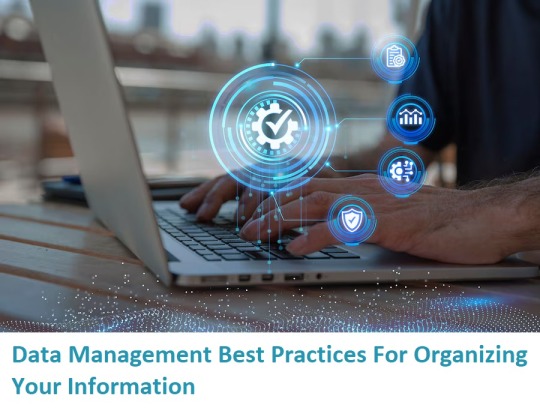#Data Organization Techniques
Explore tagged Tumblr posts
Text
Data Management Best Practices For Organizing Your Information
Effective data management is crucial for businesses to thrive in today's digital age. Organizing your information efficiently ensures data quality, enhances decision-making, and fosters growth. Implementing the right data management best practices can transform your organization's approach to handling data, ensuring seamless operations and strategic advantage.

Here, we explore the top data management strategies to help you manage your information effectively.
1. Establish Strong Data Governance Strategies: The cornerstone of effective data management lies in data governance. It involves setting policies, procedures, and standards for data handling within an organization. Strong data governance ensures that data is accurate, consistent, and secure.
Key components include:
Data Ownership: Assign clear data ownership roles to ensure accountability.
Data Policies: Develop and enforce data policies to guide data usage and management.
Compliance: Ensure compliance with regulations such as GDPR and HIPAA to avoid legal issues.
2. Implement Master Data Management (MDM): Master Data Management (MDM) is a critical aspect of data management best practices. It involves creating a single, consistent, and accurate view of the core business data, which helps reduce data duplication and ensure data integrity.
Benefits of MDM include:
Consistency: Achieve consistent data across different systems.
Accuracy: Improve data accuracy by eliminating redundancies.
Efficiency: Streamline business processes by using reliable data.
3. Utilize Advanced Data Organization Techniques: Organizing data effectively is essential for efficient data retrieval and analysis.
Advanced data organization techniques include:
Data Categorization: Classify data to simplify access and analysis.
Metadata Management: Use metadata to describe data attributes, improving data searchability.
Data Archiving: Implement data archiving solutions to manage older data efficiently.
4. Adopt Robust Data Quality Management Practices: Data quality management aims to guarantee the accuracy, completeness, and reliability of data. Top-notch data is crucial for ensuring well-informed business decisions.
Key practices include:
Data Cleansing: Regularly clean data to remove inaccuracies and inconsistencies.
Data Validation: Implement validation checks to ensure data accuracy during entry.
Data Enrichment: Enhance data quality by adding relevant information from external sources.
5. Design A Comprehensive Data Management Framework: A comprehensive data management framework provides a structured approach to managing data throughout its lifecycle.
Essential elements include:
Data Lifecycle Management: Manage data from creation to disposal.
Data Security: Employ strong security protocols to safeguard data against breaches.
Data Integration: Ensure seamless data integration across various systems and platforms.
6. Leverage Cutting-Edge Data Management Tools: Modern data management tools are indispensable for managing large volumes of data efficiently. These tools offer functionalities like data integration, quality management, and governance.
Popular tools include:
Data Integration Platforms: Tools like Informatica and Talend for seamless data integration.
Data Quality Tools: Solutions like Trillium and Ataccama for maintaining data quality.
Data Governance Tools: Tools like Collibra and Alation for effective data governance.
7. Invest In Information Management Systems: Information management systems play a vital role in organizing and managing data. These systems provide a centralized platform for storing, processing, and analyzing data. By investing in robust information management systems, businesses can enhance data accessibility, improve collaboration, and ensure data security.
8. Partner With The Best Data Management Companies: Collaborating with experienced data management companies can significantly enhance your data management capabilities. Companies like EnFuse Solutions India provide comprehensive data management services, including data governance, MDM, and data quality management. EnFuse Solutions India is renowned for its expertise in delivering tailored data management solutions that meet the unique needs of businesses.
Conclusion
Businesses must effectively manage their data to fully leverage its potential. By implementing robust data governance strategies, leveraging advanced data organization techniques, and adopting modern data management tools, companies can ensure their data is organized, accessible, and valuable. Partnering with top data management companies like EnFuse Solutions India can further enhance your data management capabilities, driving better business outcomes.
Embrace these data management best practices to stay ahead in the competitive landscape and make data-driven decisions with confidence.
#Data Management#Data Management Best Practices#Data Governance Strategies#Data Organization Techniques#Information Management Systems#Data Quality Management#Master Data Management (MDM)#Data Management Framework#Data Management Tools#Best Data Management Companies#EnFuse Solutions India
0 notes